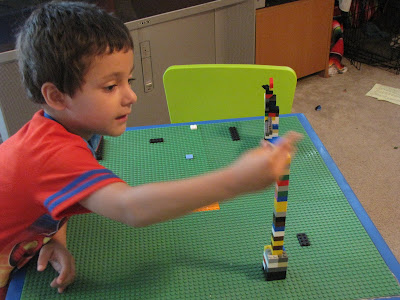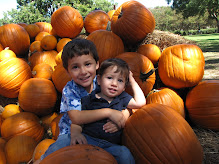At four and a half years old, Diego is definitely a bilingual child. Spanish is still his strongest language with a larger vocabulary but English is catching up at an amazing rate. He still only speaks Spanish with his father and I (something that I very much encourage) but he will switch to English or Spanish depending on the language preference of his playmates. He really has only one friend with whom he speaks Spanish. This little boy's parents do not speak English and his mother babysat for the boys while I worked. Now that his friend has entered school, I have noticed that they will sometimes speak to each other in English. This is usually when I will interrupt the conversation and ask a question in Spanish to get them back on track. It is critical to Diego's longterm language success to have many Spanish-speakers in his life.
Between Diego and Mateo, they almost always speak Spanish. I know that is it a little deceptive but if Diego says something to Mateo in English, I gently remind him that Mateo does not understand English and he must speak to him in Spanish. Diego is Mateo's hero and wants to do everything exactly like his big brother. If Mateo is going to be bilingual, it is imperative that his brother speaks to him in Spanish.
So what language does Diego speak while he is playing alone? Both. In the picture below, Diego had built two robots. One was speaking English and the other was speaking Spanish. At one point I heard one robot yell at the other, "Pero no hablo inglés!" (But I don't speak English.)


































So how do bilingual boys learn? Sorry, but I'm interested and want to know more. Thanks
ReplyDeleteHa ha ha, loved the robot comment. One of my college roommates was bilingual and her sister said to her one time "No the other perro (meaning dog in english). Still cracks me up more than 10 years later.
ReplyDeleteHow neat it is that Diego speaks both languages so fluently. We have friends whose boy is also bilingual (German/English), but he has these strange moments when he is sort of "locks up" when he is upset. Then he doesn't seem to be able to speak any language even with his parents, and they are a bit concerned about this. We are now ramping up German for Anna, but I am realistic - we can only achieve success if we spend significant time in Germany.
ReplyDeleteMy brothers and I were born in California and moved to Costa Rica when I was 6 years old. My parents prefered we spoke in Spanish when we lived in California, since all interactions with the family (cousins) was in English and when we moved to Costa Rica we were encouraged to speak English at home since we spoke Spanish in school and with our cousins.
ReplyDeleteAs an adult I do sometimes "lock Up" as mentioned on the above post, as a preschool teacher I encourage bilingual education for young children. Children will not learn all at once, I substitute words to my students, for example: Do you want some leche (milk) or agua (water)? Please close the puerts (door). It is amazing how the kids pick up on the words and start using them daily.
that's hilarious! his little play conversation.
ReplyDeletemy children's language of choice for playing together is french. when we first got to france 4 1/2 years ago, it was spanish or english, after about 8 months they started role-play playing in french and at around 12 months they made the switch to all in french. it's tough once they go to school and want to speak just like all the other children. i decided to let that one slide, since we are pretty strict about what language they speak with mom & dad, and since we are doing three languages in the home... good luck, it'll be fun to see how it all works out!
BTW, there is some sort of photobucket image "moved or deleted" in the background making it difficult to read your blog. :(
ReplyDelete